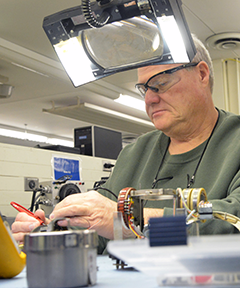3306 - Optical Instrument Repairing
Federal Occupation Description
Federal Occupation Description
This standard covers nonsupervisory work involved in troubleshooting, overhauling, modifying, maintaining, and testing optical instruments such as binoculars, telescopes, cameras, sextants, gun sights, periscopes, and cinetheodolites. These jobs primarily require knowledge and application of optical principles, procedures, and materials and, in addition, knowledge of mechanical and electrical methods of mounting and controlling optical systems.
For job opportunities in this series, go to the Office of Personnel Management USAJOBS website.
Other Federal Occupations
It is not uncommon for individuals in one federal occupational series to perform duties related to another series within the same federal occupational group. To find out about the certifications for another series in the INSTRUMENT WORK FAMILY, click on that series below. Note that credentials have not yet been identified for all series – links are provided only to those series for which the identification of credentials has been completed. Additional series will be added over time.
- 3314 - Instrument Making
- 3359 - Instrument Mechanic
- 3378 - Precision Measurement Equipment Calibrating

The following certifications have been identified as most relevant to the broad duties of this federal occupational series. Please note that these credentials may not reflect all of the unique job functions that you perform within your organization. Also these credentials may require additional education, training or experience. For more information about any credential, click on the credential title below.
| Compare | Credential | Agency | Related As | GI Bill® | Accreditation | ID | |
|---|---|---|---|---|---|---|---|
| Technician in Precision Optics (TPO) Is Not In Demand | Electronics Technicians Association, International (ETA-I) |  Some Some |
 Accreditation Accreditation
|
||||
| Specialist in Precision Optics (SPO) Is Not In Demand | Electronics Technicians Association, International (ETA-I) |  Some Some |
 Accreditation Accreditation
|
||||
| Photonics Technician Specialist (PTS) Is Not In Demand | Electronics Technicians Association, International (ETA-I) |  Most Most |
 Accreditation Accreditation
|
||||
| Photonics Technician Operator (PTO) Is Not In Demand | Electronics Technicians Association, International (ETA-I) |  Most Most |
 Accreditation Accreditation
|
Related Civilian Private Sector Occupations
The following civilian private sector occupations are similar to the duties performed by 3306 - Optical Instrument Repairing. These occupations may require additional education, training or experience. For more information about these occupations, click on the civilian occupation below.
| Civilian Job | Duties Matched | Bright Outlook | Registered Apprenticeship | Local Salary Info | |
|---|---|---|---|---|---|
| Camera and Photographic Equipment Repairers |
 Most Most
|
 Apprenticeship Apprenticeship |
 find local salary find local salary |
||
| Photonics Technicians |
 Most Most
|
 Apprenticeship Apprenticeship |
 find local salary find local salary |
 In Demand
In Demand OTHER
OTHER GI Bill®
GI Bill®  Bright Outlook
Bright Outlook